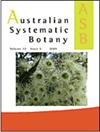Towards a new online species-information system for legumes
IF 1.6
3区 生物学
Q4 EVOLUTIONARY BIOLOGY
引用次数: 7
Abstract
The need for scientists to exchange, share and organise data has resulted in a proliferation of biodiversity research-data portals over recent decades. These cyber-infrastructures have had a major impact on taxonomy and helped the discipline by allowing faster access to bibliographic information, biological and nomenclatural data, and specimen information. Several specialised portals aggregate particular data types for a large number of species, including legumes. Here, we argue that, despite access to such data-aggregation portals, a taxon-focused portal, curated by a community of researchers specialising on a particular taxonomic group and who have the interest, commitment, existing collaborative links, and knowledge necessary to ensure data quality, would be a useful resource in itself and make important contributions to more general data providers. Such an online species-information system focused on Leguminosae (Fabaceae) would serve useful functions in parallel to and different from international data-aggregation portals. We explore best practices for developing a legume-focused portal that would support data sharing, provide a better understanding of what data are available, missing, or erroneous, and, ultimately, facilitate cross-analyses and direct development of novel research. We present a history of legume-focused portals, survey existing data portals to evaluate what is available and which features are of most interest, and discuss how a legume-focused portal might be developed to respond to the needs of the legume-systematics research community and beyond. We propose taking full advantage of existing data sources, informatics tools and protocols to develop a scalable and interactive portal that will be used, contributed to, and fully supported by the legume-systematics community in the easiest manner possible.建立新的豆科植物在线物种信息系统
近几十年来,由于科学家需要交换、共享和组织数据,生物多样性研究数据门户网站激增。这些网络基础设施对分类学产生了重大影响,并通过允许更快地访问书目信息、生物学和命名数据以及标本信息来帮助该学科。几个专门的门户网站汇集了包括豆类在内的大量物种的特定数据类型。在这里,我们认为,尽管可以访问这样的数据聚合门户网站,但一个以分类单元为重点的门户网站,由专门研究特定分类群体的研究人员社区策划,他们有兴趣、承诺、现有的合作联系和确保数据质量所需的知识,本身将是一种有用的资源,并为更通用的数据提供商做出重要贡献。这样一个以豆科(豆科)为重点的在线物种信息系统将发挥与国际数据聚合门户平行和不同的有用功能。我们探索开发以豆类为重点的门户网站的最佳实践,该门户网站将支持数据共享,更好地了解哪些数据是可用的、缺失的或错误的,并最终促进交叉分析和新研究的直接发展。我们介绍了以豆类为重点的门户网站的历史,调查了现有的数据门户网站,以评估可用的数据和最感兴趣的功能,并讨论了如何开发以豆类为中心的门户网站来满足豆类系统学研究界及其他方面的需求。我们建议充分利用现有的数据源、信息学工具和协议,开发一个可扩展的交互式门户网站,该门户网站将以最简单的方式被豆类系统学社区使用、贡献和充分支持。
本文章由计算机程序翻译,如有差异,请以英文原文为准。
求助全文
约1分钟内获得全文
求助全文
来源期刊

Australian Systematic Botany
生物-进化生物学
CiteScore
3.10
自引率
12.50%
发文量
12
审稿时长
>12 weeks
期刊介绍:
Australian Systematic Botany is an international journal devoted to the systematics, taxonomy, and related aspects of biogeography and evolution of all algae, fungi and plants, including fossils. Descriptive taxonomic papers should normally constitute a comprehensive treatment of a group. Short papers on individual species and nomenclatural papers must contain significant new information of broader interest to be considered. The prestigious L.A.S. Johnson Review Series is published. Other review articles will also be considered. All papers are peer reviewed.
Australian Systematic Botany is published with the endorsement of the Commonwealth Scientific and Industrial Research Organisation (CSIRO) and the Australian Academy of Science.
 求助内容:
求助内容: 应助结果提醒方式:
应助结果提醒方式:


